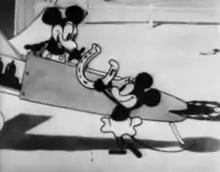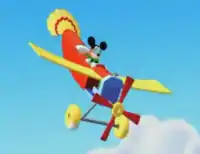Plane Crazy
Plane Crazy is a 1928 American animated short film directed by Walt Disney and Ub Iwerks. The cartoon, released in 1928 by the Walt Disney Studios, was the first creation of the character Mickey Mouse. It was made as a silent film and given a test screening to a theater audience on May 15, 1928, but failed to pick up a distributor. Later that year, Disney released Mickey's first sound cartoon, Steamboat Willie, which was an enormous success. Following this, Plane Crazy was released as a sound cartoon on March 17, 1929.[3] It was the fourth Mickey film to be released after Steamboat Willie, The Gallopin' Gaucho, and The Barn Dance (1928).
| Plane Crazy | |
|---|---|
 Minnie gives Mickey a horseshoe as a good luck charm before his flight | |
| Directed by | |
| Produced by | Walt Disney |
| Story by |
|
| Starring | Walt Disney |
| Music by | Carl W. Stalling[1] |
| Animation by |
|
| Color process | Black and white |
Production company | |
| Distributed by | Celebrity Productions |
Release date |
|
Running time | 6 minutes (one reel)[2] |
| Country | United States |
| Language | English |
Synopsis
Mickey is trying to fly an airplane to imitate Charles Lindbergh. After building his own airplane, he does a flight simulation to ensure that the plane is safe for flight but the flight fails, destroying the plane. Using a roadster and remains of his plane to create another plane, he asks a young mouse girl, Minnie, to join him for its first flight after she presents him with a horseshoe for good luck. They take an out-of-control flight with exaggerated, impossible situations. A cow briefly "rides" the aircraft. This is Clarabelle Cow making her first appearance, though the cow is actually an early, more "cowlike" predecessor of Clarabelle named Carolyn.[4] Mickey uses a turkey's tail as a tail for his plane. Once he regains control of the plane, he repeatedly tries to kiss Minnie. When she refuses, he uses force: he breaks her concentration and terrifies her by throwing her out of the airplane, catching her with the airplane, and he uses this to kiss her. Minnie then parachutes out of the plane using her bloomers. While distracted by her, Mickey loses control of the plane and eventually crashes into a tree. Minnie then lands, and Mickey laughs at her. Minnie then storms off, rebuffing him. Mickey then angrily throws the good luck horseshoe given to him by Minnie and it boomerangs around a tree, hitting him, ringing around his neck, and knocking him out; this causes stars to fly out toward the screen, with one of the stars filling the screen up, ending the film.[5]
Production
The short was co-directed by Walt Disney and Ub Iwerks. Iwerks was also the sole animator for this short and spent just two weeks working (at a rate of over 700 drawings a day to finish it) on it. The sound version contained a soundtrack by Carl W. Stalling.[6]
This was the first animated film to use a camera move. The POV shot from the plane made it appear as if the camera was tracking into the ground. In fact, when they shot this scene, they piled books under the spinning background to move the artwork closer to the camera.
Reception
The Film Daily (March 24, 1929): "Clever. Mickey Mouse does his animal antics in the latest mode via areoplane. [sic] The cartoonist has employed his usual ingenuity to extract a volume of laughs that are by no means confined to the juveniles. The sound effects are particularly appropriate on this type of film, and certainly add greatly to the comedy angle with the absurd squeaks, yawps and goofy noises."[7]
Variety (April 3, 1929): "Walt Disney sound cartoon, produced by Powers Cinephone, one of the Mickey Mouse series of animated cartoons. It's a snappy six minutes, with plenty of nonsensical action and a fitting musical accompaniment. Constitutes an amusingly silly interlude for any wired house. Disney has derived some breezy situations, one or two of them a bit saucy but, considering the animal characters, permissible."[8]
DVD release
Plane Crazy (as well as Steamboat Willie) has been released as part of the Walt Disney Treasures DVD collections twice:
- On disc one of Mickey Mouse in Black and White
- On disc two of The Adventures of Oswald the Lucky Rabbit, as part of a tribute to animator Ub Iwerks
Legacy

- In 1930 the story of Plane Crazy was adapted and used for the first story in the Mickey Mouse comic strip. This adaptation, entitled "Lost on a Desert Island," was written by Walt Disney with art by Ub Iwerks and Win Smith.[9]
- In the Mickey Mouse short The Nifty Nineties (1941), Mickey and Minnie's car runs out of control and runs into a cow. The scene was taken almost directly from Plane Crazy.
- The cartoon Mickey's Airplane Kit (1999) from the series Mickey Mouse Works and House of Mouse featured a similar premise in which Mickey built his own airplane to impress Minnie.
- In the television series Mickey Mouse Clubhouse (2006–2016), Mickey regularly flies the plane from Plane Crazy which he calls the Toonplane.
- In Porco Rosso, in a theater in Milan, Porco watches a movie which has references to vintage cartoons.
- In the feature film Walt Before Mickey, Plane Crazy was featured.[10]
- Plane Crazy plays in a continuous loop in the Main Street Cinema at Disneyland, albeit silently, next to Steamboat Willie.[11]
See also
References
- AllMovie
- MUBI
- Lenburg, Jeff (1999). The Encyclopedia of Animated Cartoons. Checkmark Books. pp. 107–109. ISBN 0-8160-3831-7. Retrieved June 6, 2020.
- "Clarabelle Cow (From Disney) - WeirdSpace".
- Plane Crazy (film) - D23
- "1928: Plane Crazy". Disney Shorts. Archived from the original on March 1, 2012. Retrieved October 18, 2012.
- "Short Subjects: Sound". The Film Daily: 12. March 24, 1929. Retrieved February 23, 2020.
- "Talking Shorts". Variety: 11. April 3, 1929. Retrieved February 23, 2020.
- "Lost on a Desert Island".
- Walt Before Mickey (2015) - Connections - IMDb
- Main Street Cinema|Rides & Attractions|Disneyland Park|Disneyland Resort
External links
- Plane Crazy on YouTube (official posted by Walt Disney Animation Studios)
- Plane Crazy at IMDb

- Plane Crazy at The Big Cartoon DataBase

- Plane Crazy at Disney A to Z

- Plane Crazy at The Encyclopedia of Disney Animated Shorts
